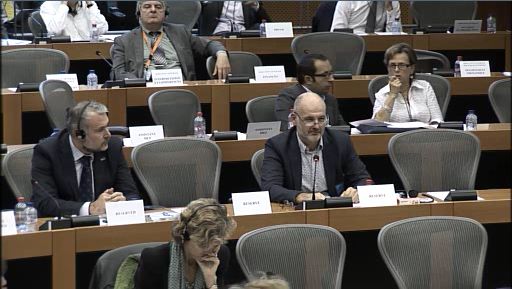ISCA President shares ISCA/CEBR report findings and MOVE Week projections at European Parliament CULT Committee hearing
21/09/2015

The economic cost of physical inactivity in Europe came to the fore in the European Parliament’s Committee on Culture and Education (CULT) meeting and workshop on 14 September.
Other key topics on the agenda were the roles of social inclusion, integration, education and culture in the promotion of sport and physical activity. But after a presentation from Anna Kleissner from SportEconAustria on the economic dimensions of sport and an intervention from ISCA President Mogens Kirkeby on ISCA and Cebr’s recent study on the economic costs of physical inactivity, Member of European Parliament (MEP) Sylvia Costa underlined the need to focus on participation in physical activity as a vital part of this picture:
“I think it was also important to deal with the economic aspects of sport. The costs of not doing sport, however, should be included in this – I’m talking about health care costs, the costs in lives and the costs involved in not following a healthy lifestyle and developing certain illnesses. I think that’s a very important point.”
ISCA was among three invited stakeholders from the sport sector asked to contribute to the discussion at the hearing. This gave the floor to ISCA President Mogens Kirkeby to present the striking findings of ISCA and Cebr’s report “The Economic Cost of Physical Inactivity in Europe” and MOVE Week as an example of a broad-reaching activation event organised by an association from the sport sector:
“We asked (Cebr) to find the figure of the cost of inactivity in Europe and the figure is not small: 80 billion euro,” Kirkeby said. “If you see the growth potential in sports participation, then growing participation will grow sport’s economic impact.”
Among the EU Members of Parliament present were Julie Ward (S&D, UK), Hannu Takkula (ALDE, Finland) and Bogdan Wenta (EPP, Poland), who voiced their concerns about Europe’s “physical inactivity time bomb” and their support for the NowWeMOVE campaign earlier this year.
The Head of the EU Sport Unit, Yves le Lostecque, announced the preliminary results of the European Week of Sport, estimating that 3000 events took place with 5 million participants. With MOVE Week’s contribution to this initiative, Kirkeby predicted this would add around 6000 events to the European Week of Sport’s 3000.
The full hearing can be viewed on-demand at the European Parliament’s website (Mogens' intervention can be viewed at 17:28:50).
To organise a MOVE Week event and add to the official European Week of Sport and MOVE Week event tally, find out more and register here
Posted on 21/09/2015 by

